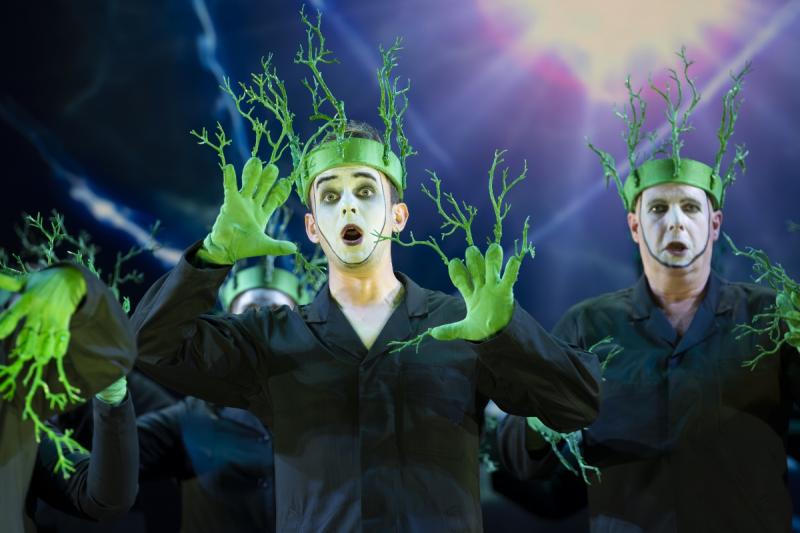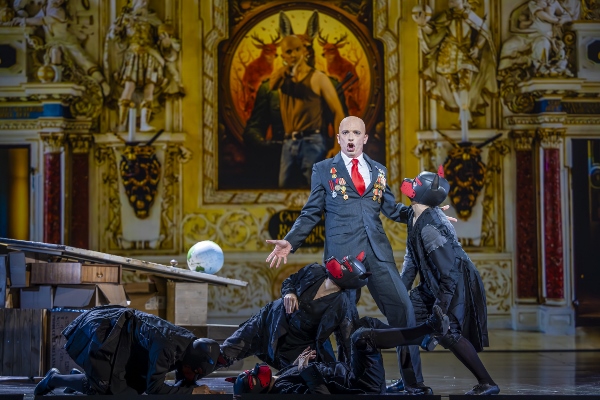Masque of Might, Opera North review - a tale of ecological virtue | reviews, news & interviews
Masque of Might, Opera North review - a tale of ecological virtue
Masque of Might, Opera North review - a tale of ecological virtue
Pountney plunders Purcell to make the greenest show in a green season

Sir David Pountney’s creation of a “masque” performance for our times, recycling music Purcell wrote for his, is downright good entertainment even if the plotline’s a bit incoherent.
Now that’s a virtue, if you look at the 17th century models he’s starting from. Shows with masques never were designed to have much narrative logic, and the music – even when it had words attached – could as easily fit one story as another.
So for this new “eco-entertainment” he’s plundered several of Purcell’s stage works including The Indian Queen, The Tempest and The Fairy Queen, and crowbarred in several pieces originally written for the church or ceremonial purposes, as well as standalone songs.
One thing he wisely doesn’t try to include is spoken dialogue: there are side-screens that outline the events we’re supposed to be seeing as well as giving us the words that are sung, but apart from what’s on those you’d better get a programme book (or, to be more ecologically virtuous, download one in electronic form) and read it.  Because the subject is itself ecological virtue. It’s the greenest part of Opera North’s “green” season, and tells of an absolutist ruler, Diktat, who devotes himself to stopping climate protesters and being sceptical about the destruction of the environment. Until near the end, when he witnesses an enactment of a Bible story, as told in Purcell’s Saul and the Witch of Endor, and realises he's got it all wrong.
Because the subject is itself ecological virtue. It’s the greenest part of Opera North’s “green” season, and tells of an absolutist ruler, Diktat, who devotes himself to stopping climate protesters and being sceptical about the destruction of the environment. Until near the end, when he witnesses an enactment of a Bible story, as told in Purcell’s Saul and the Witch of Endor, and realises he's got it all wrong.
It forms an interesting interlude and gives the production the chance to re-use Falstaff’s caravan from the last new show, this time as the witch’s lair. Diktat sees the error of his ways but still gets removed from the scene, and the Queen of Night appears to help earth find its healing. All ends, if a bit incongruously, with optimism and a burst of song and dancing.
It's very cleverly done, with only eight replacements of the first line of a number’s original text to bend it to the storyline. It’s not so much the lines themselves, however, as the general tenor of the text and music that still jar somewhat in their new context: Purcell didn’t do irony in his music, so “Come ye sons of art” and “Sound the trumpet” (from the Ode for the birthday of Queen Mary) and a couple of numbers from Welcome Song for King James II come over as testimonials of full-hearted rejoicing when Diktat is the bad guy, much as similar items do in the happy ending when he’s out of the way. You can’t easily get round the single-track “affection” concept at the heart of baroque music creation.
The second part of the show, which is longer than the first, might even have existed on its own as a one-act piece, with less strain on credibility as roles change character from sycophants to dissidents. In the end, I suppose, looking for that kind of consistency in the narrative is to bring an expectation from today’s world that the 17th century wouldn’t have bothered about – but the message of the piece, unless it’s to be one of sheer cynicism, needs to be serious. True, it’s presented with lavish spectacle and visual ingenuity – Leslie Travers’ design and particularly Marie-Jeanne Lecca’s riotously varied-period costume creations never let things down – but the audience I joined wasn’t sure whether to look for laughs or not (there were mild titters on a couple of occasions). In both of those aspects the production is following the eco theme of the season, by re-using stuff from the scene store where possible and employing fairly easily found materials in imaginative ways. The visuals are also very much enhanced by video designer David Haneke’s superb backdrops and animations.
The music, in the care of Harry Bicket, is first rate, with a judicious variety of continuo textures providing richness for the big numbers and delicacy for the gentler ones. ’Tis nature’s voice – introduced at a point where the planet itself tells the agents of exploitation what they should realise – is a moving example. And the choral numbers are often extremely powerful (though Hear my prayer, O Lord, in the first part, was a little over full of vibrato for a sacred composition).  The soloists are an inspired choice, not only in their ability to inhabit widely varied personas (all but two have more than one role) but also in sheer vocal quality. Callum Thorpe as Diktat, has a richly versatile range of tone and uses it with skill; Anna Dennis brings beautiful purity to her role as Elena and changes virtuosically into an Earth Mother, a Green politician, the tealeaf-reading Witch (pictured above) and then the healing Queen of the Night.
The soloists are an inspired choice, not only in their ability to inhabit widely varied personas (all but two have more than one role) but also in sheer vocal quality. Callum Thorpe as Diktat, has a richly versatile range of tone and uses it with skill; Anna Dennis brings beautiful purity to her role as Elena and changes virtuosically into an Earth Mother, a Green politician, the tealeaf-reading Witch (pictured above) and then the healing Queen of the Night.
James Laing and James Hall (two sycophants at the outset who finally change into dutiful good guys) are each baroque specialists and a fine double act in countertenor duet; Xavier Hetherington makes his mark as Saul (among other things), and Matthew Brook likewise as Sceptic in the second part and as Samuel in the witch mini-scene. And Andri Björn Róbertsson makes an impressive Opera North debut as the super-being Nebulous in the first part, and also as Activist and with a Wolf’s head on later.
The six-strong dance team make their lively contribution, both in bringing the animal kingdom to life and other respects, and the Chorus of Opera North are, as ever, energetic movers to Denni Sayers’ choreography as much as lovely singers.
rating
Explore topics
Share this article
The future of Arts Journalism
You can stop theartsdesk.com closing!
We urgently need financing to survive. Our fundraising drive has thus far raised £49,000 but we need to reach £100,000 or we will be forced to close. Please contribute here: https://gofund.me/c3f6033d
And if you can forward this information to anyone who might assist, we’d be grateful.

Subscribe to theartsdesk.com
Thank you for continuing to read our work on theartsdesk.com. For unlimited access to every article in its entirety, including our archive of more than 15,000 pieces, we're asking for £5 per month or £40 per year. We feel it's a very good deal, and hope you do too.
To take a subscription now simply click here.
And if you're looking for that extra gift for a friend or family member, why not treat them to a theartsdesk.com gift subscription?
more Opera
 MARS, Irish National Opera review - silly space oddity with fun stretches
Cast, orchestra and production give Jennifer Walshe’s bold collage their all
MARS, Irish National Opera review - silly space oddity with fun stretches
Cast, orchestra and production give Jennifer Walshe’s bold collage their all
 Káťa Kabanová, Glyndebourne review - emotional concentration in a salle modulable
Janáček superbly done through or in spite of the symbolism
Káťa Kabanová, Glyndebourne review - emotional concentration in a salle modulable
Janáček superbly done through or in spite of the symbolism
 Buxton International Festival 2025 review - a lavish offering of smaller-scale work
Allison Cook stands out in a fascinating integrated double bill of Bernstein and Poulenc
Buxton International Festival 2025 review - a lavish offering of smaller-scale work
Allison Cook stands out in a fascinating integrated double bill of Bernstein and Poulenc
 Tosca, Clonter Opera review - beauty and integrity in miniature
Happy surprises and a convincing interpretation of Puccini for today
Tosca, Clonter Opera review - beauty and integrity in miniature
Happy surprises and a convincing interpretation of Puccini for today
 Hamlet, Buxton International Festival review - how to re-imagine re-imagined Shakespeare
Music comes first in very 19th century, very Romantic, very French operatic creation
Hamlet, Buxton International Festival review - how to re-imagine re-imagined Shakespeare
Music comes first in very 19th century, very Romantic, very French operatic creation
 Falstaff, Glyndebourne review - knockabout and nostalgia in postwar Windsor
A fat knight to remember, and snappy stagecraft, overcome some tedious waits
Falstaff, Glyndebourne review - knockabout and nostalgia in postwar Windsor
A fat knight to remember, and snappy stagecraft, overcome some tedious waits
 Salome, LSO, Pappano, Barbican review - a partnership in a million
Asmik Grigorian is vocal perfection in league with a great conductor and orchestra
Salome, LSO, Pappano, Barbican review - a partnership in a million
Asmik Grigorian is vocal perfection in league with a great conductor and orchestra
 Semele, Royal Opera review - unholy smoke
Style comes and goes in a justifiably dark treatment of Handelian myth
Semele, Royal Opera review - unholy smoke
Style comes and goes in a justifiably dark treatment of Handelian myth
 Le nozze di Figaro, Glyndebourne review - perceptive humanity in period setting
Mostly glorious cast, sharp ideas, fussy conducting
Le nozze di Figaro, Glyndebourne review - perceptive humanity in period setting
Mostly glorious cast, sharp ideas, fussy conducting
 Fidelio, Garsington Opera review - a battle of sunshine and shadows
Intimacy yields to spectacle as Beethoven's light of freedom triumphs
Fidelio, Garsington Opera review - a battle of sunshine and shadows
Intimacy yields to spectacle as Beethoven's light of freedom triumphs
 Dangerous Matter, RNCM, Manchester review - opera meets science in an 18th century tale
Big doses of history and didaction are injected into 50 minutes of music theatre
Dangerous Matter, RNCM, Manchester review - opera meets science in an 18th century tale
Big doses of history and didaction are injected into 50 minutes of music theatre
 Mazeppa, Grange Park Opera review - a gripping reassessment
Unbalanced drama with a powerful core, uninhibitedly staged
Mazeppa, Grange Park Opera review - a gripping reassessment
Unbalanced drama with a powerful core, uninhibitedly staged

Add comment